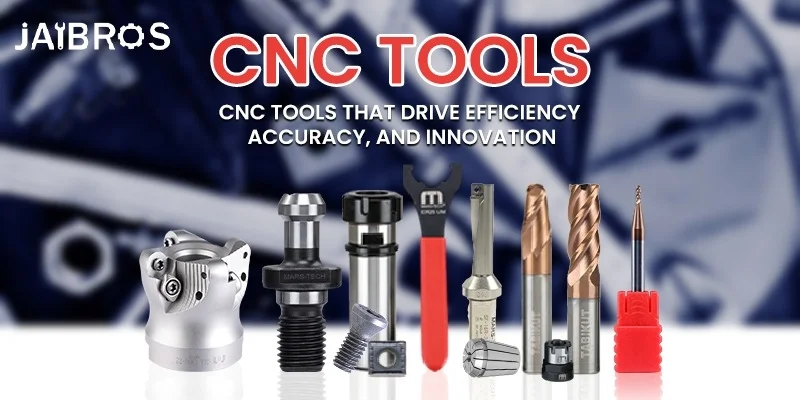See how CNC tools help Indian workshops get precise, fast, and smooth metal cutting results, making daily machining work easier and more reliable.
What Are CNC Tools?
CNC Tools are unique cutting devices that are used in machines, which operate using digital signals; they read programmed commands rather than gauging or measuring with your hand or by guesswork. Because these tools move with precision, the tool cuts the metal at the correct depth, angle, and direction. CNC Tools can be used in the form of turning inserts, drill bits, milling cutters, threading inserts, and grooving tools, among others. Most CNC Tools are manufactured from strong materials such as carbide, which resists heat, pressure, and continuous cutting without losing its shape.
Where Are CNC Tools Used?
These tools are found in almost all workplaces that are involved in the production of components that are made out of metal, more broadly, in India, these tools are used in industries and businesses related to automotive, fabrication, railways, engineering, machine manufacturing, valve manufacturing, and industrial machine shops. These tools can be used to cut a steel bar, drill holes in a steel plate, cut a groove in a shaft, or build a component for a machine, all while providing accuracy and precision. These tools are also extremely useful projects where the parts must be a perfect fit relative to themselves - engine components, fittings, couplings, or machine accessories.
How to Use CNC Tools in Daily Work
After the machine is setup, the operator simply grabs the appropriate tool, secures it into the tool holder, then loads the CNC program with the specified cutting speed, feed, tool path, and depth into the machine. The operator checks for basic safety and then starts the machine, which will independently cut the metal and repeat the same part over and over until the job is complete, while the operator monitors for vibration, heat, tool wear, sound, and coolant. The cutting will be uniform and achieve a quality finish.
Why These Tools Are Important in Today’s Workshops
Workshops need dependable tools to achieve the same size, fit, and finish for every batch. Manual tools cannot maintain strict accuracy, especially during long production cycles. CNC-based methods help reduce waste, maintain tool life, control heat, and avoid mistakes. One big reason behind their popularity is the widespread use of carbide grades. Carbide inserts are strong, heat-resistant, and able to keep their shape even when cutting tough metals. They can be replaced easily, which saves money and reduces machine downtime. Because of these advantages, the use of CNC Tools has increased across India.
Different Types of CNC Cutting Tools
Workshops use many kinds of tools depending on the job:
Turning Tools – Used in lathes to remove material from rotating parts. Different shapes like CNMG, TNMG, and VNMG are chosen for roughing or finishing work.
Milling Tools – Used for shaping flat, curved, or stepped surfaces. End mills, face mills, shell mills, and small cutters like 3 mm mills are used for fine cuts.
Drilling Tools – Used for making holes in metal. Carbide drills, solid drills, and U-drill inserts are popular because they give clean and straight holes.
Grooving and Parting Tools – Used for cutting grooves and separating a finished part from the bar.
Threading Tools – Used for making internal and external threads with perfect size and pitch.
Benefits for Indian Workshops
Indian industries depend on reliable machine parts for daily production. When workshops use computer-controlled tools, they get several advantages such as:
-
Higher accuracy because the tool follows exact digital commands
-
Faster completion of bulk orders
-
Lower manual errors
-
Smooth surface finishes with minimal burrs
-
Reduced costs because inserts can be replaced without buying new holders
These benefits help workshops improve their customer service and accept more complex orders confidently.
Choosing the Right Tool for Your Work
The performance of the tool depends on whether you select the correct type. Factors you should consider include:
-
Material Type: Steel, aluminium, cast iron, and stainless steel require different carbide grades.
-
Tool Geometry: Shapes, angles, cutting radii, and chip breakers affect finish quality.
-
Tool Size: Small cutters help in tight spaces or fine finishing.
-
Operation Type: Milling, drilling, turning, threading, or parting require different tool styles.
-
Brand Quality: A trusted brand ensures stable performance and long tool life.
If you buy tools online, always check material, coating, geometry, and return policies before placing an order.
Simple Tips to Increase Tool Life
To get maximum life from your tools:
-
Use correct speed and feed rates
-
Apply coolant to reduce heat
-
Keep the tool holder clean
-
Avoid overloading the tool
-
Replace inserts before they become fully dull
These habits reduce breakage and maintain stable machining performance.
FAQs
1. What are CNC tools?
They are precision cutting tools used inside computer-controlled machines.
2. Why are they used in workshops?
They help produce accurate and repeatable metal parts.
3. Are carbide tools better?
Yes, carbide stays sharp longer and handles high heat.
4. Can beginners use them?
Yes, once setup is done, the machine handles most work.
5. Can I buy these tools online?
Yes, many online stores in India like jaibros offer reliable cutting tools.






